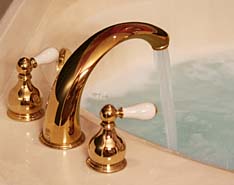Water Heater Recall a Tankless Job
Thursday, May 17, 2007
 Three brands of tankless hot water heaters have been identified as potential sources of deadly carbon monoxide emissions, prompting a voluntary recall of the systems by Rheem Manufacturing, and Paloma Industries Inc. before they make people sick - or worse.
Three brands of tankless hot water heaters have been identified as potential sources of deadly carbon monoxide emissions, prompting a voluntary recall of the systems by Rheem Manufacturing, and Paloma Industries Inc. before they make people sick - or worse. Signs of carbon monoxide poisoning range from flu-like symptoms, to dizziness, headaches, nausea, vomiting, or fainting spells. If you have any, or all of these symptoms, open the windows of your home and seek medical attention immediately.
In February, the U.S. Consumer Product Safety Commission together with CSA International cited three models of the Power Vent Tankless Water Heater because of a defective switch caused by the shifting of components inside the heater when it was moved, likely just before installation. Even if the heater was hooked up by a licensed professional and inspected, a filter door may not work properly, leading to the release of deadly carbon monoxide into the home.
That's exactly what happened to Matt Varble in Clinton, Illinois. When the carbon monoxide detectors went off in his brand-new house on Christmas Day last year, he couldn't trace the source and installed a costly air exchanger to ward off the deadly emissions. It wasn't until later, when he was poking around the Internet and read about the recall on LawyersandSettlements.com.
He realized only then that his expensive tankless water heater, only a few months old, was the likely culprit.
Tankless water heaters were designed to be more efficient and better for the environment than hot water tanks, because they heat water on demand. Instead of the traditional round water tank that's always full and takes energy to keep the water hot - the tankless system is a rectangular box with piping at the top and bottom, and heats only what you need.
The problem has to do with the way a tankless heater works. It requires more air to operate than traditional hot water tanks, and also needs to be properly vented. As well, the air filter door needs to be in just the right spot for the tank to operate safely. Shipping may have affected a switch that controls the positioning of the filter door.
This door is the thing that has everybody worried. If the switch is defective, and the filter door is out of whack, you could wind up with carbon monoxide poisoning.
Affected are three models of the Power Vent 199,990 BTUH Tankless Water Heater under the brands Rheem, Ruud, Richmond, Rheem-Ruud, and Paloma. The recall went into effect on February 21st 2007 and affects $55 million dollars worth of indoor tankless water heaters. In the United States and Canada, the manufacturer will repair the defect for free, although Illinois' Matt Varble would prefer a replacement unit. He paid three times what it would have cost him for a traditional hot water tank, only to be faced with a situation that may put his family at risk.
He's not alone. 42,000 tankless systems were sold to contractors and consumers from May 2004 until December 2006, and all are included in the recall.
Homeowners should be aware of the type of system they have, and if it is tankless - make a note of the model and serial number and contact the manufacturer right away. You'll find the information on the rating plate - which is a small, silver sticker located on the lower, right-hand corner of the front panel.
If the filter door appears to be out of place, or if you have been feeling ill for no apparent reason, DON'T use your hot water and consult your doctor, or go to the hospital for potential C02 poisoning. A blood test will show if you've been exposed to carbon monoxide, which can be deadly.
Like having a smoke detector, it's always good advice to install working CO2 detectors on every level of your home, outside sleeping areas, to protect you from accidental exposure to carbon monoxide, regardless of the source.
As for a defective tankless hot water system, it's the manufacturer's responsibility. If you have fallen ill, or if you have spent your own money on repairs or upgrades where the tankless hot water heater is found to be at fault, you should be compensated.
By Gordon Gibb
http://www.lawyersandsettlements.com/articles/00794/water-heater-recall.html
Labels: tankless water heater, water heater, water heaters